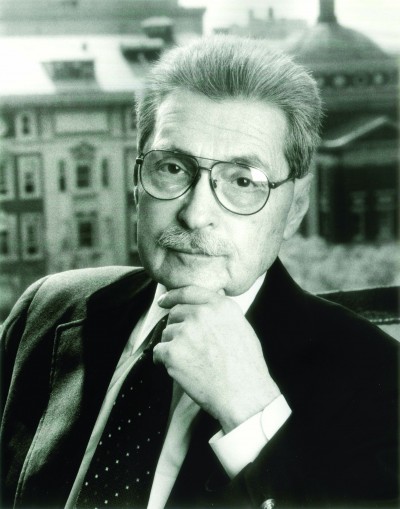On Thursday, December 13 at 4:00 p.m., Columbia College will celebrate the life of Steven Marcus CC’48, GSAS’61, former dean of the College and the George Delacorte Professor Emeritus in the Humanities, who passed away in April 2018. The memorial celebration is open to all who wish to join in remembering him and will be held in the Faculty Room of Low Library on what would have been Marcus’ 90th birthday. His former student and colleague, Dr. Rita Charon GSAS’99, professor of medical humanities and ethics and chair of the Department of Medical Humanities and Ethics, provided this memorial in his honor.

Steven P. Marcus CC’48, GSAS’61
GUENTER KNOP
Columbia was privileged to be Marcus’s professional home for the preponderance of his life in letters. After attending the College, he completed a master’s degree in English at the Graduate School of Arts and Sciences in 1949, writing a thesis on Henry James under the supervision of eminent Jamesian scholar F.W. Dupee. He was awarded a fellowship to study in Cambridge 1952–1954 with F.R. Leavis, whose snobbery about Dickens inspired Marcus to write From Pickwick to Dombey as his doctoral dissertation, which he defended in 1961. Throughout and beyond his doctoral training, also at the Graduate School of Arts and Sciences, he studied and wrote with Trilling, becoming his co-author and colleague in their shared work in psychoanalytic literary criticism. Marcus served twice as chair of the Department of English and Comparative Literature and fulfilled simultaneously the roles of vice president for Arts and Sciences and dean of Columbia College (1993–1995). Active at the Medical Center as well as on the Morningside campus, he was named principal investigator in the Columbia Project on Conflicts in Values and Health Care.
Marcus was a leader in the world of literary studies and, even more broadly, of the study of the humanities. He was one of the founders of the National Humanities Center (NHC), created in 1987 under the auspices of the American Academy of Arts and Sciences as an independent institute for advanced study in the humanities. It was Marcus who conceptualized NHC’s mission, chose its site in North Carolina, worked with the architects to design the structure and chaired the executive committee of the NHC Board of Trustees. He inspired the American Academy to develop the “Humanities Indicators,” a remarkable resource that tracks the humanities’ accomplishments in fulfilling a variety of academic and pedagogic goals.
Those who, like me, were fortunate to have been his students and colleagues never stopped being floored by the extent of his knowledge and the ever-repeated demonstrations that not only had he read everything but he had never forgotten any of it. He could discourse authoritatively on contemporary Chinese social sciences, Schubert’s art songs and the status of the American League’s pennant race. He was a formidable teacher, demanding from students the same textual precision and encyclopedic vision he bent toward his own work. Despite or perhaps by virtue of a certain severity, he demonstrated unconditionally that our work mattered to him and that he had a stake in our getting it right. At the same time, we all experienced his unalloyed kindness — leaning forward to assist in troubles of work and life. We also shared in Marcus’ joy — at a turn of phrase or an oddball fact, at learning something new, at being surprised. To make Marcus laugh gave one not only a sense of belonging to his tribe but a validation of one’s own delight at knowing, sensing, perceiving, treasuring the worth of this living, this life.
Above all else, Marcus bequeathed to his colleagues and students and associates a commitment to freedom. Ideas were not to be restricted to a particular scholarly discipline or theoretical school. There were no politically correct or incorrect boundaries around thinking thoughts and using words. To open one’s thoughts and feelings to take in the social contexts, the aesthetic properties, the historical situations, the psychological and sensory dimensions, the unsayable implications of things was what one does. Being with him simply made life larger than life.
Marcus died on April 25, 2018, at the age of 89. He is survived by his wife, sociologist and children’s rights activist Gertrud Lenzer; his son John Nathaniel Marcus; and his grandson Asa Sky Marcus. A memorial celebration, open to all who wish to join in remembering him, will be held in the Faculty Room of Low Library on Thursday, December 13, at 4:00 p.m., on what would have been his 90th birthday.
Dr. Rita Charon GSAS’99